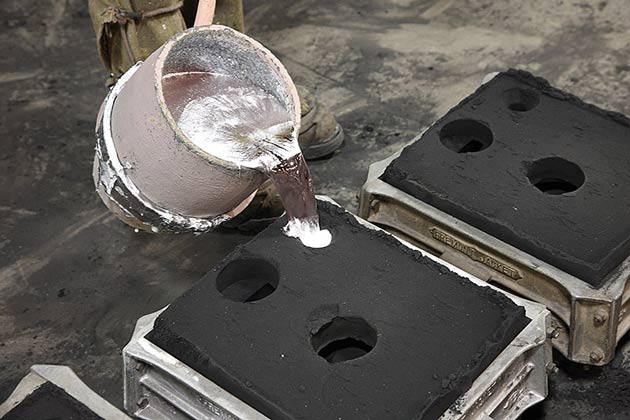Stahl Specialty Company Fundamentals Explained
Table of ContentsMore About Stahl Specialty CompanyA Biased View of Stahl Specialty Company7 Simple Techniques For Stahl Specialty CompanySome Known Facts About Stahl Specialty Company.Our Stahl Specialty Company Ideas
Chemical Comparison of Cast Aluminum Alloys Silicon advertises castability by lowering the alloy's melting temperature level and boosting fluidity throughout casting. Additionally, silicon adds to the alloy's strength and use resistance, making it useful in applications where durability is crucial, such as vehicle parts and engine elements.It likewise boosts the machinability of the alloy, making it simpler to refine right into finished products. In this means, iron adds to the overall workability of light weight aluminum alloys.
Manganese contributes to the strength of light weight aluminum alloys and improves workability. Magnesium is a light-weight component that gives toughness and impact resistance to light weight aluminum alloys.
Zinc boosts the castability of light weight aluminum alloys and assists manage the solidification process throughout spreading. It enhances the alloy's stamina and firmness.
Stahl Specialty Company Can Be Fun For Anyone
Since aluminum-silicon alloys have great casting residential properties, high gas properties, straightforward processes, and exceptional corrosion resistance, aluminum-silicon alloys are most generally utilized in the die-casting sector in the house and abroad. At the very same time, aluminum-silicon alloys are also fairly early and extensively recognized alloys created and used in die-casting. After continuous research study and improvement, a lot of the existing worldwide mainstream aluminum-silicon alloys have been finalized and are absolutely nothing greater than A356, A360, A380, ADC12, B390, and A413.
The key thermal conductivity, tensile toughness, yield toughness, and elongation vary. Among the above alloys, A356 has the highest possible thermal conductivity, and A380 and ADC12 have the cheapest.

Stahl Specialty Company Fundamentals Explained
In precision spreading, 6063 is appropriate for applications where elaborate geometries and premium surface area finishes are paramount. Examples include telecommunication rooms, where the alloy's premium formability permits streamlined and aesthetically pleasing styles while keeping structural stability. In the Lights Solutions sector, precision-cast 6063 parts produce elegant and efficient lights fixtures that require intricate forms and great thermal performance.
(https://sketchfab.com/stahlspecialc)
It leads to a better surface finish and much better deterioration resistance in A360. The A360 exhibits superior prolongation, making it suitable for complex and thin-walled parts. In accuracy casting applications, A360 is fit for markets such as Consumer Electronics, Telecommunication, and Power Devices. Aluminum Castings. Its improved fluidness enables complex, high-precision elements like smartphone coverings and communication gadget real estates.

In precision casting, aluminum 413 shines in the Customer Electronic Devices and Power Devices sectors. It's generally utilized to craft elaborate elements like mobile phone housings, camera bodies, and power device casings. Its precision is impressive, with tight tolerances up to 0.01 mm, making certain perfect item setting up. This alloy's premium rust resistance makes it an exceptional selection for outside applications, ensuring long-lasting, durable items in the discussed sectors.
Not known Factual Statements About Stahl Specialty Company
As soon as you have actually determined that the light weight aluminum die casting process appropriates for your job, a critical next step is selecting one of the most suitable alloy. The aluminum alloy you select will significantly influence both the casting procedure and the residential or commercial properties of the last item. Because of this, you need to make your choice meticulously and take an enlightened technique.
Identifying the most ideal light weight aluminum alloy for your application will certainly indicate evaluating a broad array of characteristics. These comparative alloy characteristics follow the North American Die Casting Association's guidelines, and we've divided them into two classifications. Foundry near me. The first category addresses alloy characteristics that affect the manufacturing process. The second covers features influencing the residential or commercial properties of the final product.
The alloy you choose for die casting directly affects several aspects of the casting process, like just how simple the alloy is to function with and if it is prone to casting flaws. Warm splitting, also called solidification fracturing, is a common die spreading defect for light weight aluminum alloys that can result in internal or surface-level splits or splits.
How Stahl Specialty Company can Save You Time, Stress, and Money.
Specific aluminum alloys are much more susceptible to hot cracking than others, and your choice needs to consider this. An additional common flaw found in the die casting of light weight aluminum is pass away soldering, which is when the actors sticks to the die wall surfaces and makes ejection difficult. It can damage both the cast and the die, so you need to look for alloys with high anti-soldering properties.
Rust resistance, which is currently a remarkable attribute of light weight aluminum, can differ substantially from alloy to alloy and is an essential particular to think about depending on the environmental problems your product will be revealed to. Use resistance is one more building frequently sought in light weight aluminum items and can differentiate some alloys.